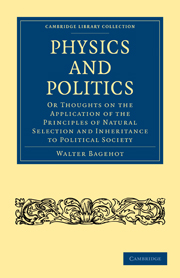 Physics and Politics
Physics and Politics Summary
In the last essay I endeavoured to show that in the early age of man—the ‘fighting age’ I called it—there was a considerable, though not certain, tendency towards progress. The best nations conquered the worst; by the possession of one advantage or another the best competitor overcame the inferior competitor. So long as there was continual fighting there was a likelihood of improvement in martial virtues, and in early times many virtues are really ‘martial’—that is, tend to success in war—which in later times we do not think of so calling, because the original usefulness is hid by their later usefulness. We judge of them by the present effects, not by their first. The love of law, for example, is a virtue which no one now would call martial, yet in early times it disciplined nations, and the disciplined nations won. The gift of ‘conservative innovation’—the gift of matching new institutions to old—is not nowadays a warlike virtue, yet the Romans owed much of their success to it. Alone among ancient nations they had the deference to usage which combines nations, and the partial permission of selected change which improves nations; and therefore they succeeded. Just so in most cases, all through the earliest times, martial merit is a token of real merit: the nation that wins is the nation that ought to win.
- Type
- Chapter
- Information
- Physics and PoliticsOr Thoughts on the Application of the Principles of Natural Selection and Inheritance to Political Society, pp. 81 - 111Publisher: Cambridge University PressPrint publication year: 2010First published in: 1873


